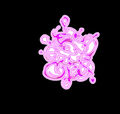Pink (nonfiction): Difference between revisions
No edit summary |
|||
| Line 5: | Line 5: | ||
<gallery> | <gallery> | ||
File:Pink City.jpg|link=Pink City (nonfiction)|January 16, 2018: Chromatographic analysis of ''[[Pink City (nonfiction)|Pink City]]'' "at least two, possibly three" previously unknown shades of pink. | File:Pink City.jpg|link=Pink City (nonfiction)|January 16, 2018: Chromatographic analysis of ''[[Pink City (nonfiction)|Pink City]]'' "at least two, possibly three" previously unknown shades of pink. | ||
File:Taffy Bomb.jpg|link=Taffy Bomb (nonfiction)|October 16, 2017: Spectrographic analysis of ''[[Taffy Bomb (nonfiction)|Taffy Bomb]]'' reveals "at least two, possibly three" previously unknown shades of the color pink. | |||
</gallery> | </gallery> | ||
Revision as of 19:41, 27 December 2018
Pink is a pale red color that is named after a flower of the same name. It was first used as a color name in the late 17th century. According to surveys in Europe and the United States, pink is the color most often associated with charm, politeness, sensitivity, tenderness, sweetness, childhood, femininity and the romantic. A combination of pink and white is associated with chastity and innocence,whereas a combination of pink and black links to eroticism and seduction.
In the News
January 16, 2018: Chromatographic analysis of Pink City "at least two, possibly three" previously unknown shades of pink.
October 16, 2017: Spectrographic analysis of Taffy Bomb reveals "at least two, possibly three" previously unknown shades of the color pink.
Fiction cross-reference
Nonfiction cross-reference
External links:
- Pink @ Wikipedia


